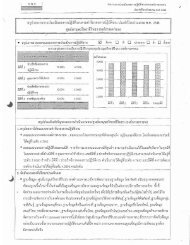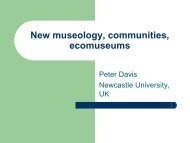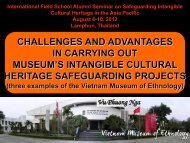Director’sBiographyThe Sirindhorn Anthropology Centre is pleased to welcome anew director, Dr. Somsuda Leyavanija, who joined the SAC in 2 January2013. Originally from Phra Nakhon Si Ayutthaya province, Dr. Somsuda hadthe opportunity to see many parts of Thailand as a child, as her father wasengineer for a sugar refinery with operations in different locations. Her motherwas an English teacher who always encouraged Dr.Somsuda to learn Englishthrough books and magazines, which equipped her with an interest and giftfor language-learning ever since. She also credits her experience in boardingschool for teaching her to be “strong, orderly, tolerate, independent and capableof solving problems at hand.”After completing high school level from Rajini School, Dr. Somsudajoined an AFS (American Field Service) program and spent a year as an exchange student in U.S.A. She thencontinued her undergraduate study at the Faculty of Archaeology, Silpakorn University. Later, she was granted theAnanda Mahidol Foundation scholarship and pursued her Master’s degree in Anthropology at the University of Otagoin New Zealand, graduating in 1979. In 1988, Dr. Somsuda completed a Ph.D. degree in Prehistory from the AustralianNational University with the Ananda Mahidol Foundation scholarship as well.Her first duty after the completion of her Ph.D. degree was to serve as an archaeologist at the Division ofArchaeology, Fine Arts Department. At that time, she was responsible for the preparation of World Heritage nominationfiles for three cultural heritage sites: namely, Ban Chiang, Sukhothai and Ayutthaya, and her work was successfullyaccomplished, as they were listed by UNESCO as “World Heritage” sites. She was later assigned to a bureaucraticposition at the Division of Archaeology, where she traveled with the director and head archaeologist to work in manydifferent regions. Her work during this period included research at the Ban Chiang heritage site and a historical areasstudy project in Nakhon Nayok province. Moreover, in addition to being consistently active in Thailand’s archaeologicalsector, Dr. Somsuda has had many opportunities to experience different types of work, since she has taken upvarious positions such as Secretary of the Director General of the Fine Arts Department, Director of the Chiang MaiNational Museum, Director of the Office of Archaeology, Director of the National Archives of Thailand and DeputyDirector General of the Fine Arts Department. Her last position before joining the Sirindhorn Anthropology Centre wasDirector General of the Fine Arts Department, where she fully dedicated her archaeological experiences in lookingafter Thailand’s heritage. Especially in the time of natural disaster, Dr. Somsuda always paid close attention to thesituation, monitoring the recovery of archaeological sites in the disaster areas. Moreover, Dr. Somsuda was appointedby the Government as a representative of Thailand on the World Heritage Committee and took part in the 17th GeneralAssembly of State Parties to the World Heritage Convention and the 35th UNESCO General Conference.Apart from the administrative tasks, Dr. Somsuda also produced a wide range of academic literatures that aresignificant for Thailand’s archaeological research and study. She played a vital role in compiling and translating theFine Arts Department’s books and documents, namely “Theories and Practices for the Preservation of Monuments andArchaeological Sites”(หนังสือทฤษฎีและแนวปฏิบัติการอนุรักษ์อนุสรณ์สถานและแหล่งโบราณคดี), “The Fine Arts DepartmentStandards and Practices in the Management of Archaeological Sites, Archaeology and Museums”(หนังสือร่างมาตรฐานและแนวปฏิบัติของกรมศิลปากรในการจัดการโบราณสถาน โบราณคดีและการพิพิธภัณฑ์), “Management Guidelines for WorldHeritage Sites” (หนังสือแนวทางการจัดการโบราณสถานในบัญชีมรดกทางวัฒนธรรมของโลก) and “Mexico City Declarationon Cultural Policies of UNESCO” (หนังสือการประกาศนโยบายด้านวัฒนธรรมของนครเม็กซิโกขององค์การยูเนสโก).
Engaging Cultural Rights in Research,Practice and Policy:Lessons from the Culture and Rightsin Thailand ProjectFeatured Post:by Coeli BarrySenior Advisor, Cultural Rights Forum, Lecturer at the Institute of Human Rights and Peace Studies, MahidolUniversity. Coeli Barry can be contacted via the Institute at http://www.ihrp.mahidol.ac.th/Cultural institutions around the world today are facing challenges in terms of how theypreserve and disseminate knowledge about cultural heritage. Over the past 20 years, changes ininformation technology and a greater appreciation of the power of representation are promptingpublic institutions to re-assess policies and guidelines about who should have access to existingholdings and how new information should be gathered and made available to the public. Institutionsincreasingly find themselves facing decisions about the ethics of making digitized material morewidely available to source communities, as well as about how anthropological materials shouldbe collected and displayed.In some cases, cultural institutions, such asmuseums, libraries, archives and research centers,have developed restricted access protocols and digitalrepatriation policies in response to the demands ofcommunities to either return items or facilitate greatercommunity access. Even if cultural institutions are notdirectly challenged by community claims, they may still takepart in the widespread and lively debate in professionalgatherings, scholarly outlets and on the internet aboutthe most suitable institutional policies that can takeaccount of the interests of the ‘culture bearers’ alongsidethose of the public more widely. In fields as diverse asmuseum studies, archaeology, knowledge management,heritage studies, visual arts, and anthropology, there isan increasing awareness of the potential for innovationin how anthropological knowledge is gathered, used anddisplayed.One framework that is emerging as particularlysalient for practitioners and scholars alike is a rightsbasedapproach to heritage management. This approachdraws on international human rights conventions thatpromote the notion of ‘a right to culture’ in a general sense,as well as those documents that address cultural rightsfor minorities, or the rights of communities to participatein managing their heritage in more particular cases. Theright to culture and the right to “belong to” a culture hasbecome an increasingly important topic in contemporaryacademic debates, and this concept has found expressionin international human rights instruments, including the2001 Universal Declaration on Cultural Diversity. Nationalgovernments may not uniformly or enthusiastically endorsethese international rights documents, even when theysign them. Nonetheless, practitioners, scholars, rightsadvocates and community leaders reference them anddraw on rights norms in their own work.In 2009, researchers at the Princess Maha ChakriSirindhorn Anthropology Centre (SAC) proposed toundertake a project on Culture and Rights in Thailand(CRT) with the goal of understanding how these issueswere being negotiated in the context of Thailand. Theconcept of cultural rights and the right to culture isrelatively new in Thailand, and the CRT sought to identifyif there were local, vernacular equivalents to the Western,international discourse of cultural rights. Thailand’s







